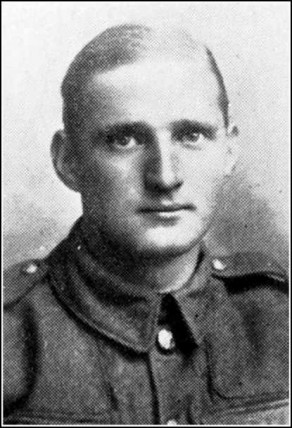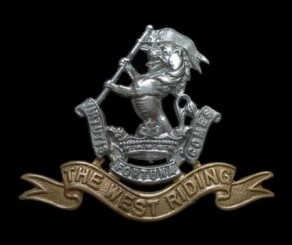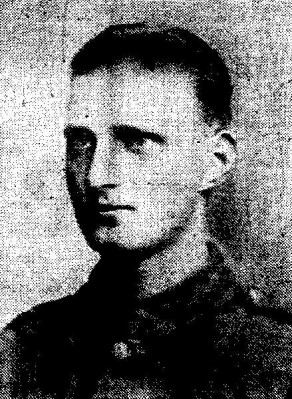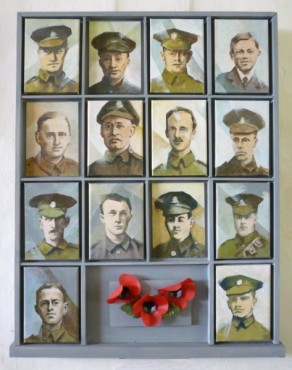‘The Westmorland Gazette’ (27 November 1915)
(Kindly supplied by Sedbergh & District History Society)
ROLL OF HONOUR – LANCE-CORPL. BENNETT, SEDBERGH
Mr. and Mrs. W.E. Bennett, of Sedbergh Station, received a letter on Wednesday morning from Corpl. H.L. Mason, conveying to them the sad intelligence that their only son, Lance-Corpl. Noel Bennett, of the Duke of Wellington’s Regiment, has been killed in France on the 19th inst. He had left a trench to bring in a wounded man when he was shot through the head by a sniper and killed instantaneously. The deceased soldier was only 19 years of age, and his death is greatly regretted. This is the first fatality among the Sedbergh men who are on active service. Much sympathy is felt with the bereaved father, mother and sister.
‘The Westmorland Gazette’ (4 December 1915)
(Kindly supplied by Sedbergh & District History Society)
A SEDBERGH SOLDIER’S DEATH: MEMORIAL SERVICE
Sorrow for the untimely, but heroic, death of Lance-Corpl. Bennett, of the West Riding Regiment, only son of Mr. and Mrs. Bennett of Sedbergh Station, and respect for his bereaved parents and sister, were manifested at the memorial service in the Sedbergh Parish Church on Wednesday afternoon. As already reported, Lance-Corpl. Bennett was shot through the head by a German sniper on the 19th ult., while endeavouring to rescue a wounded comrade and carry him into the trench. The service was largely attended, almost every part of the valley being well represented. The ordinary burial service was used, and the hymns ‘Fight the good fight’ and ‘On the resurrection morning’ were sung, Mr. A.E. Thorne being at the organ. The officiating clergy were the Revs. J. Montague Cadman and H.F.D. Selby. There was a full detachment of Boy Scouts present, and the church flag hung at half-mast. The Rev. J.M. Cadman, vicar, said Lance-Corpl. Bennett was the first of their men whom they knew to have fallen. They grieved over the shutting off of a bright young life, full of promise, brave, cheerful, willing, thoughtful for others, who had endeared himself to his comrades and won the respect of his officers. The qualities which he had showed there as a Boy Scout had developed in degree. The devotion to duty and the self-sacrifice of the dead was a type and self-reflection of the great Self-sacrifice. Therefore they must not sorrow as those who had no hope. A life of full service, however brief, crowned by a death of willing sacrifice, was one which they might envy. At the end of an impressive service, the organist played the ‘Dead March in Saul,’ the congregation standing.
THE TESTIMONY OF COMRADES
Second-Lieut. Harris, A Co. of the 10th Duke of Wellington’s West Riding Regt., writing from the trenches to Mrs. Bennett on the 20th November, says: “It is with the deepest regret that I have to tell you of your son Noel’s death. It was yesterday morning that it happened. There was one of our men [Private John Cardwell] out sniping in front of our lines, when the other man out with him returned to tell us he had been hit. When your son heard this, he was out after him, but as where the man lying wounded was in a very exposed position, they saw him, and, poor chap, he was hit through the head, and death was instantaneous. Words of mine are inadequate to you in your terrible loss, but he died like a man and a soldier, trying to rescue a wounded comrade. Your son had been in my platoon ever since he joined the battalion. He was always a good worker and always of good cheer. In him I have lost one of my best men. I shall always remember him as a fearless lad. He was always one of the first to come forward on any work that was at all risky. I myself used always to want him, because he could be relied on. He was most popular with everybody. The chaplain will write and tell you where he is laid to rest. May I take this opportunity of conveying to you, his parents, my deepest sympathy and condolences.” Another letter from a comrade tells how Lance-Corpl. Bennett was buried, he and Capt. [Corpl.] H.L. Mason, another Sedbergh man, being present. A cross has been put on his grave, also his name Noel in small pieces of red brick. He lies next to the man he tried to save. The writer says that less deeds than Noel Bennett’s have been awarded the V.C.–From the chaplain, 21st November, 1915: The Rev. W.L. Henderson, chaplain 69th Field Ambulance, in the course of his letter, says:–Noel Bennett was buried in a little cemetery immediately behind the trenches. A small cross will be put up to the memory of him and the soldier who lies beside him, and the ground for ever kept sacred. The cemetery is in Northern France near the town of Chapelle d’Armentières. Both officers and men joined with him in expressing their deep sympathy. The chaplain goes on to tell Mr. and Mrs. Bennett that their son will be greatly missed by all, but that in their sorrow it will be some comfort to them to know that he died so nobly and that their sorrow is shared by others.–Mr. and Mrs. Bennett have also had letters from Private J. Tuddenham, A Co., 10th W.R. Regt., and also from Corpl. H.L. Mason, of Sedbergh, who expresses his sympathy and then describes how his friend met his death. “He was a good soldier and a good pal, always bright and cheerful even under the most trying conditions. I shall miss him greatly because we have been pals ever since I joined A Company.”–Preaching at the Vale of Lune Chapel on Sunday afternoon, the Rev. H.F.D. Selby said Noel Bennett had fought the good fight and won the eternal crown. All hearts in the parish would go out to his sorrowing parents and sister.
'The Kendal Mercury' (20 October 1916)
(Kindly supplied by Sedbergh & District History Society)
SEDBERGH – SERGT. H.L. MASON
Sergt. Harry Lyddington Mason, aged 27, was killed in action in France on Sunday, October 8th. He was the elder son of Mr. and Mrs. John Mason, of Serbergh. Deceased joined the army in August, 1914, being attached to the Duke of Wellington’s Regiment, and went to the front in August, 1915. He was well known in the Sedbergh district where he was deservedly popular with all classes. Quarter-Master-Sergt. Stephenson, W.R. Regt., writing to his parents said, “It is with deep regret that I have to perform the painful duty of informing you that your son Harry was killed in the performance of his duties on Sunday, the 8th October, about 8 a.m. It might be a little consolation to know that he died instantly without suffering any pain. Harry was one of my greatest friends and most capable of Sergeants; also a great favourite with officers and men alike. Sergt. Davies wishes me to inform you that he will write as soon as he possibly can. They have had a hard time, and he is not quite himself yet.” The letter concluded with the expression of the greatest sympathy in their sudden and sad bereavement.
‘The Westmorland Gazette’ (28 October 1916)
(Kindly supplied by Sedbergh & District History Society)
MEMORIAL SERVICES – Sedbergh
An impressive service was held in Sedbergh Parish Church on Wednesday evening in memory of Sergt. H.L. Mason and Private H. Clemmet, both of the Duke of Wellington’s Regt., who were recently killed in action. As the large congregation was assembling the organist (Mr. A.E. Thorne) played Chopin’s ‘Marche Funèbre,’ and the service began with the singing of the hymn ‘The Son of God goes forth to war.’ This was followed by suitable prayers, the 130th Psalm, and a lesson. The officiating clergy were the vicar, the Rev. A.H. Walker, and the Rev. H.F. Donaldson-Selby. Other hymns sung were ‘Lead, kindly Light’ and ‘Peace, perfect peace.’ At the close the organist played the Dead March in ‘Saul,’ the congregation standing, and that piece of Mendelssohn’s which is known as his ‘Funeral March.’
'The Kendal Mercury' (3 November 1916)
(Kindly supplied by Sedbergh & District History Society)
SEDBERGH – MEMORIAL SERVICE
There was a large congregation in St. Andrew’s Church on Wednesday, when a memorial service was held in memory of Sergeant Lyddington Mason and Private Harry Clemmet, who have fallen in the war. The Vicar, the Rev. A.H. Walker, took the major portion of the service, and the lesson was read by the Rev. H.F. Donaldson of Selby. The special hymns were ‘The Son of God goes forth to war,’ ‘Lead kindly Light,’ and ‘Peace, perfect peace.’ At the conclusion of the service the organist, Mr. A.E. Thorne, played the ‘Dead March.’
‘The Westmorland Gazette’ (6 October 1917)
(Kindly supplied by Sedbergh & District History Society)
MASON – In loving memory of Sergt. Harry L. Mason, who fell on the Somme, October 8th, 1916.
Fondly remembered by father, mother, and brother. Main Street, Sedbergh.
‘The Westmorland Gazette’ (5 October 1918)
(Kindly supplied by Sedbergh & District History Society)
MASON – In loving memory of Sergt. Harry L. Mason, who fell on the Somme, October 8th, 1916, aged 27 years.
Fondly remembered by father, mother, and brother.
‘The Westmorland Gazette’ (11 October 1919)
(Kindly supplied by Sedbergh & District History Society)
MASON – In loving memory of Sergt. Harry L. Mason, who was killed in the Somme battle October 8th, 1916, aged 27 years.
Ever remembered by father, mother and brother. Main Street, Sedbergh.
BRITISH BATTALIONS ON THE SOMME, by Ray Westlake (Pen & Sword Books Limited 1994)
10th (Service) Bn. Duke of Wellington’s (West Riding Regiment)
In support during attack on Le Sars (7/10). Relieved and to Round Wood on (8/10), Albert (9/10).
[Henry Lyddington Mason was killed in action on the 8 October 1916.]
England & Wales, National Probate Calendar (Index of Wills and Administrations), 1858-1966
1917
MASON Harry Lyddington of Main-street Sedbergh Yorkshire a sergeant in the West Riding regiment died 8 October 1916 in France Administration (with Will) Wakefield 12 June to John Mason ironmonger. Effects £201 1s. 11d.











No comments yet.